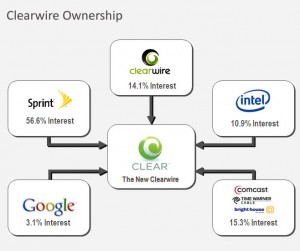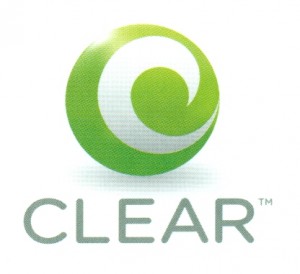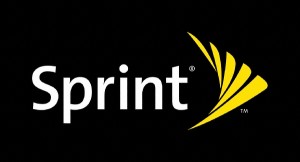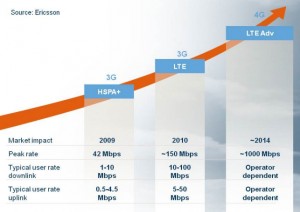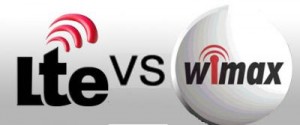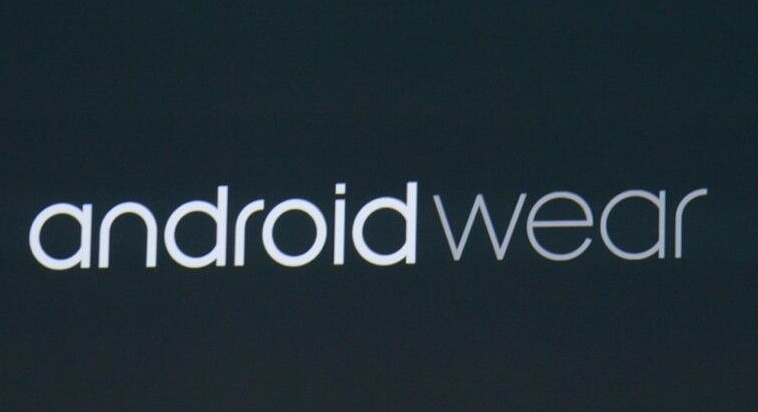Clear and Sprint Enter into Arbitration:
Yesterday a number of Sprint Nextel (NYSE:S) and Clearwire (NASDAQ:CLWR) stories came across the wires. Â AndroidandMe and FierceWireless both reported that the two carriers have entered into an arbitration process regarding the “Premium Fee” of $10 per month for Evo 4G and Epic 4G phones. Â Clearwire said that there are nearly 810,000 customers with either the Evo or Epic phones; out of these customers Clearwire estimates as many as 364,500 of them are being used in cities without WiMAX deployment areas. Â This has led Sprint to reevaluate the agreement that they have with Clear.
Currently every Evo or Epic owner pays a 4G tax (although it is clearly not called that) of $10 a month; this is in addition to their plan and taxes. Â This fee is passed through to the consumer to offset costs that Sprint and Clear had written into the wholesale agreement.
“We do have an agreement between the parties,” added Clearwire Chief Commercial Officer Mike Sievert during Clearwire’s conference call. “What we have right now is a difference in interpretation of it.”
If No Agreement Can Be Made What Will Happen to Clear?
If Clearwire and Sprint cannot come to an agreement it may very well be the final nail in the coffin. Â Clearwire has stated that they stand to lose about $17 million dollars in revenue if this is unresolved. Â In their 10-Q Statement to the SEC, Clearwire stated:
Based on our current projections, we do not expect our available cash and short-term investments as of September 30, 2010 to be sufficient to cover our estimated liquidity needs for the next 12 months. We also do not expect our operations to generate positive cash flows during the next 12 months. Â Without additional financing sources, we forecast that our cash and short-term investments would be depleted as early as the middle of 2011.
Clearwire had just announced that they were laying off 15% of their workforce and taking other measures to cut back spending. Â While Sprint does have the controlling stake in Clearwire with 54% of the shares, they also purchase the WiMAX (4G) service from Clearwire. Â The impact on Clearwire is quite easy to understand, either bankruptcy or sell to a foreign company. Â If there is no offer in the near future, it might be safe to say that wholesale WiMAX is doomed. Â (Not to say it wasn’t already doomed as the majority of carriers around the world have stated that LTE is the future).
Clear Drops Its Retail Plans:
Interestingly, Clearwire had been planning on opening up more retail outlets of it’s own.
“Thus, it is implementing a series of significant cash conservation measures to reduce costs, including: a substantial reduction in sales and marketing spending, a suspension of additional retail channel market launches of the CLEAR-branded operations in select markets including Denver and Miami, delays in the introduction of CLEAR-branded smartphones…” source
Could Sprint have been worried that Clear retail outlets would cannibalize some of the sales of 4G phones such as the Epic and Evo? Â The more Clear pushed into being it’s own retail outlet the more it would compete against Sprint.
What About Sprint?
Probably the worst possible outcome for Sprint would be if Clearwire were to go bankrupt or have to shutter it’s doors.
According to Sprint’s 2008 Annual Report filed with the SEC:
“At closing, we contributed $3.3billion of net assets, including our 2.5 gigahertz, or GHz, spectrum and WiMAX related assets.”
This leaves Sprint in a precarious position. Â Do they choose to try and sell the Clearwire spectrum? Â Do they try to find some new partners to buy into Clear? Â Or is it time to sell off completely, and be left without a “4G” network?
“A Clearwire default may affect about $9.9 billion of Sprint Capital Corp.’s debt, according to a report from Standard & Poor’s,” reports Bloomberg.
So, does Sprint try to double down on Clear? Â If Sprint wants to remain the third largest carrier in the United States it cannot afford to lose it’s biggest current selling point; being the first 4G network in the country. Â With no definitive plan to move forward with an LTE deployment, Dan Hesse told GigaOm, “Our 4G strategy is WiMAX, full stop!” Â Does Sprint have a choice? Â Is there any other option but to try and pick up the slack and get Clear through the short-term losses? Â Can Clearwire or Sprint keep the joint venture afloat long enough to get back into the black?
What About Upgrades?
If Clearwire is able to stay in business they will have to continue pleasing their customers. Â “Clearwire ended the third quarter with 2.84 million total subscribers, consisting of 1.01 million retail subscribers and 1.83 million wholesale subscribers. Â During the third quarter, Clearwire added 1.23 million total net new subscribers, including 150,000 retail additions and 1.1 million wholesale additions…. This dramatic increase in wholesale subscribers includes users of multi-mode 3G/4G devices in areas outside Clearwire markets….. As of September 30, approximately 45% of the Company’s wholesale subscribers resided outside of Clearwire’s launched markets.” Â It is safe to say that a large percentage of the increased wholesale additions rest solely on the fact that Sprint released the two WiMax devices. Â Now that LTE has begun to go live in some smaller markets with MetroPCS and Verizon Wireless is about to begin their roll out of LTE as well, Clearwire will have to make some big moves in the off chance they can stay alive.
Verizon Wireless has stated that their LTE throughput is as high as 5 to 12 Mbps download speed, and 2 to 5 Mbps upload speed. Â WiMax Rel. 1 cannot compete with that. Â Current WiMax speeds tend to average about 5-7Mbps down, and (since I am on Sprint) are limited to 1Mbps up. Â There is a new revision that is due to be rolled out sometime in 2011-2012. Â WiMax 1.5 which should boost speeds to “between 40Mbps and 150Mbps, while WiMax 2.0 will deliver 128Mbps to 360Mbps. (These of course are theoretical and with ideal conditions, real world will certainly be far less than that). Â Is it possible that we will see the passing of WiMax so soon?
